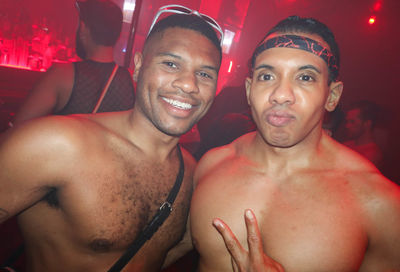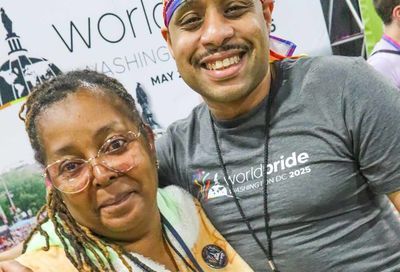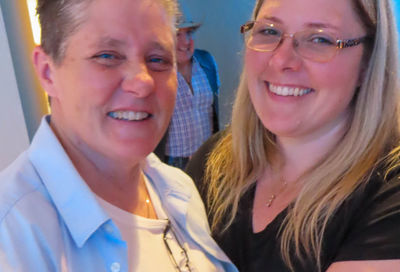‘Cats: The Jellicle Ball’ Gloriously Queers Up a Classic (Review)
Andrew Lloyd Webber's beloved musical gets a glamorous makeover, brilliantly celebrating the queer ballroom scene.

The global phenomenon known as Cats began percolating in 1977 when composer Andrew Lloyd Webber decided to musicalize segments from T.S. Eliot’s Old Possum’s Book of Practical Cats, one of his favorite childhood books. One can only imagine Webber’s pitch to producer Cameron Mackintosh a few years later.
“Cameron, I’m imagining a musical set in a junkyard, based entirely on these stories of cats. But the actors portray the cats with costumes and make-up and they move as though they are felines. There is no dialogue. They all just sing and dance. Also, the plot is paper-thin. It involves an older figure, Old Deuteronomy, who after witnessing their stories through song, chooses one of the junkyard cats to ascend to kitty heaven for eternal life.”
Surprisingly, McKintosh nipped. More surprisingly, it was a monumental hit, both in London and New York, spawning a video film in the late nineties, several revivals, and an infamous feature film in 2019 that has become a never-ending punchline for theater fans and movie buffs.
Now, the stage musical has come back to life as Cats: The Jellicle Ball, a wildly imaginative reinvention. Eliot’s book and Webber’s score remain, but it is far from the Cats you remember.
Gone are the tails and whiskers. The giant tire in the junk heap? Nixed. Instead, costume designer Qween Jean has adorned the cast with glamorous, eye-dazzling pieces. This is Cats reconceived through a queer lens, specifically the eyes of ballroom culture. Think Pose, but with purrs.
Directors Zailon Levingston and Bill Rauch, along with choreographers Arturo Lyons and Omari Wiles, don’t give us cats in a literal (or imagined) sense. The program notes state that “in the context of our production, ‘cat’ is slang for any queer person or ally who is part of the Ballroom scene.”
And what cool cats they are. Even before the stunning opening number, “Jellicle Songs for Jellicle Cats” ends, the audience thunderously applauds, eager to see where the journey will take them. It introduces them to some marvelous performers, including Sydney James Harcourt, whose Rum-Tum Tugger is a fickle rockstar, always on the prowl for the next attraction.
Harcourt’s “bad boy” energy is ideal for the role, and vocally, he’s a standout. So is Antwayn Hopper as Macavity. Hopper’s bass voice and lithe movements bring Eliot’s character to vibrant life.
“Tempress” Chasity Moore has perhaps the most challenging part as Grizzabella, a faded ballroom star who now, in her older years, feels forgotten. Moore is tasked with delivering the production’s built-in showstopper, the infinitely recognizable “Memory,” and she performs it with extraordinary pathos and heartbreak.
Broadway veteran Andre DeShields, who proudly states his age as 78, makes a distinguished and classy Old Deuteronomy who glides with authority and style. As Gus the Theatre Cat, Junior Labeija — an original member of The House of Labeija, one of the most famous houses in Ballroom — reminisces about his greatest role, and holds court for anyone willing to listen. To have this legend in the cast makes the production all the more resonant.
Under William Waldrop’s musical direction, the orchestra unearths the jubilance in Webber’s score and the cast — along with the audience — couldn’t possibly extract more enthusiasm from it.
Initially slated for a limited run, it’s impossible to say whether this Cats, like its predecessors, will have a longer life. And worthwhile as it is, it might even benefit from a smaller, more intimate space. In the new Perelman Performing Arts Center, Cats at times feels too cavernous, too spread out. A smaller space would embolden its sense of community. Still, Cats: The Jellicle Ball is worthy of a strut to New York before its heels are packed away.
Cats: The Jellicle Ball (★★★★☆) runs through August 11 at the Perelman Performing Arts Center, 251 Fulton St. in New York City. Tickets are $68 to $309. Visit www.pacnyc.org.
Support Metro Weekly’s Journalism
These are challenging times for news organizations. And yet it’s crucial we stay active and provide vital resources and information to both our local readers and the world. So won’t you please take a moment and consider supporting Metro Weekly with a membership? For as little as $5 a month, you can help ensure Metro Weekly magazine and MetroWeekly.com remain free, viable resources as we provide the best, most diverse, culturally-resonant LGBTQ coverage in both the D.C. region and around the world. Memberships come with exclusive perks and discounts, your own personal digital delivery of each week’s magazine (and an archive), access to our Member's Lounge when it launches this fall, and exclusive members-only items like Metro Weekly Membership Mugs and Tote Bags! Check out all our membership levels here and please join us today!






















You must be logged in to post a comment.